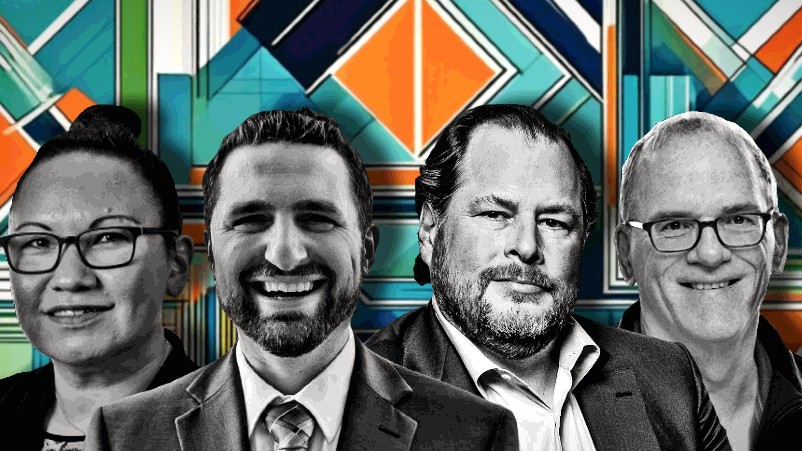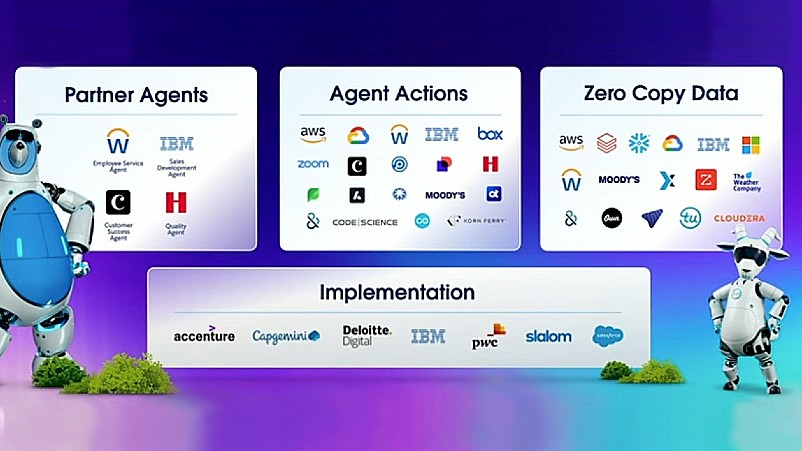Salesforce CEO Marc Benioff promises an end to ‘DIY AI,' taps frustrations over complexity. "You could feel customers exhale" says Constellation's Liz Miller, "Now he needs to deliver."

Liz Miller, Kevin Quigley, Marc Benioff, and Doug Henschen
Salesforce CEO Marc Benioff declared the end of 'DIY AI' at the cloud giant’s heaving annual tech conference in San Francisco last week, tapping already frustrated boards, c-suite and operating executives on the complexity, time and budgets to achieve meaningful AI deployments and business improvement. The only beneficiaries so far were “frontier” AI companies, Benioff punched home to media earlier in the week - hundreds of billions, he said, had been invested in these firms with little revolution for business to see versus the hype. Saks Fifth Avenue, Gucci, publisher Wiley, and ANZ’s Fisher & Paykel were among those in early trials for the biggest bet Salesforce has made since its early shift to a SaaS-based cloud model – autonomous, reasoning AI agents. "You don't need to DIY your AI. This is the big fundamental thought,” Benioff said repeatedly over three days. “Our job is to break DIY AI.” The message hit home with customers, say analysts, "But now he needs to deliver."
What you need to know
- Salesforce is pushing an alternative AI strategy that advocates low code-no code autonomous AI agents baked into custom business deployments using unstructured data from individual firms.
- The advantage of the model is it leverages existing investments and capabilities and should speed up time to value for businesses looking for a return from AI.
- The vendor is positioning its “Agentforce” platform as the next step change in industry AI, announcing dozens of custom industry templates set for release next month.
- Early trials are returning impressive results with educational publisher Wiley seeing a 40-45% improvement in customer contact centre case resolutions, Gucci boosting sales via call centre by 30 per cent and Saks Fifth Avenue boasting improved personalisation and enhanced in-store operations.
- Salesforce CEO Marc Benioff, speaking at Dreamforce, claimed Agentforce will outperform OpenAI on Azure in cost, time, value, and accuracy.
What Benioff and Salesforce have rightly identified is that in the middle of all of the excitement and personal adoption of Generative AI there is still a swirl and undertow that is defeating the best of intentions and excitement. AI is messy.
In a move intent on wedging Microsoft, OpenAI and other firms overselling what it says are AI “untruths”, Salesforce has flipped rising business frustration with AI programs into what it claims is “next-generation AI” using low code-no code autonomous AI agents baked into custom business deployments and tapping unstructured data from individual firms.
“We're not just tossing you another model or tossing you a hyperscaler, or tossing you an AI engineer,” Benioff said during his keynote address at last week's Dreamforce conference. “We're just saying on the platform that you already… use every day, the Salesforce platform … you're going to start to find this incredible new functionality."
Benioff’s huff was evident with Microsoft’s competitive fudging days earlier, when he criticised blending the terms co-pilot and agent along with ongoing claims of AI accuracy benchmarks which were pacing behind Salesforce and others. "There's a lot of narratives out there from vendors, and a lot of it is not true,” he said, assigning Microsoft's much-hyped Copilot AI as just another much-maligned Clippy assistant. “I really think that Copilot is the next Clippy … this idea that it hasn't really delivered for customers what they intended. It's cute, it's fun, does some things... and then you're not really using it.”
Salesforce argued in every corner that the journey from chatbots to co-pilots and now to autonomous agents represented a material leap in business AI. Chatbots were simple, rule-based interactions, co-pilots provided more advanced assistance. But autonomous agents can understand context, reason, plan and take independent actions across multiple systems, channels and databases – including automating arduous human effort writing and updating rules and journey flows for the chatbots and co-pilots currently in market.
The software giant is positioning its 'Agentforce' platform as the next step change in industry AI, announcing dozens of custom industry templates set for release in October. The vendor's also citing a McKinsey study predicting 72 per cent of AI business improvements will come from customer-facing functions.
At the core of these autonomous agents is a reasoning engine called Atlas, developed by Salesforce engineers, which simulates how humans think, plan and take actions. “All I have to do is deploy this agent and it works everywhere, whether we're in voice like we just were a moment ago, or whether we're in Apple business messages or in a chat on our website, it's just works. It's all one agent," said EVP of Product & Industries Marketing, Patrick Stokes, during a demonstration. "If you can describe it, Agentforce can probably do it.”
Writing on LinkedIn, Constellation Research analyst Doug Henschen said, "Benioff made a pretty compelling case for Data Cloud and the Salesforce platform as the basis of building agents. The approach taps data, metadata and knowledge of app business logic that's all already in Salesforce. Data Cloud adds data federated from third-party data clouds and ingested from external apps. The pitch that everything is in one platform and not a DIY project has attendees here at Dreamforce nodding their heads."
Henschen's colleague, Constellation Research VP and Principal Analyst Liz Miller, told Mi3, "What Benioff and Salesforce have rightly identified is that in the middle of all of the excitement and personal adoption of Generative AI there is still a swirl and undertow that is defeating the best of intentions and excitement. AI is messy. The data isn't magical... it doesn't just appear and march in line. Models aren't big format blocks... more like those teenie logos... and you really need to pay close attention to how it comes together."
This message of don't DIY was clearly welcome to the Dreamforce audience, Miller continued. "You could feel the exhale. AI has still been in experiment mode. Executives are still developing strategies to apply AI for real business use cases... use cases beyond the obvious of 'I put a chatbot on my service page to try to deflect customers.' So the idea of pre-built, pre-architected use cases specific to functions that drive business growth like selling coaches and marketing optimisation agents is exceedingly attractive."
But now the pressure is on for Benioff, according to Miller. "He threw down the gauntlet and called co-pilots a waste of time and effort. Nothing more than fancy Clippy. Agents are the third wave. Now... he has to ensure everyone can ride that wave and really surf."

Significant improvements
The Salesforce platform includes tools for building and customising agents using advanced retrieval augmented generation (RAG) techniques to pull in both structured and unstructured data, including text, images, audio, and video but in a low-code approach. What that means is companies can create and deploy AI agents without extensive technical expertise.
Early trials of Salesforce autonomous agents at Wiley, Saks and Gucci presented significant improvements in customer service efficiency, sales performance, and employee productivity.
- Wiley: 40-45% improvement on customer contact centre case resolutions versus its previous chatbot; updated version of Atlas (reasoning engine) achieving volume 90-95% resolution of all service and sales issues.
- Gucci: 30% increase in sales through call centre with no reduction in workforce.
- Saks Fifth Avenue: More seamless agent-to-human omnichannel experience, improved personalisation, and enhanced in-store operations.
Wiley: Educational publishing company Wiley implemented autonomous agents to handle its peak back-to-school sales period. Kevin Quigley, Senior Manager of AI and efficiency at Wiley said the company had seen a 40 per cent plus an increase in case resolution compared to its old chatbot, expanded self-service capabilities, reduced complexity in design and implementation. The business could handle surge capacity without additional hiring.
"We were able to expand the self-service topics we're covering compared to our old chatbot, from the most important and common issues that we were getting to virtually every question that can be answered by our knowledge base for that product,” Quigley said. "There's something really interesting that's happening with agents, which is you're shifting that conversational experience design from being this sort of tedious back and forth collaboration between your support experts and your IT resources, your CRM and your programmers. Now, there's a bigger focus on the conversation just by those support and product experts."
Gucci: The luxury brand implemented AgentForce in its Florence, Italy contact centre, one of the first in-market trials of autonomous agents by Salesforce. “They have a call centre of… 300-500, you buy something at Gucci anywhere in stores anywhere in the world, you call the call centre,” Benioff said. “We deployed our technology there and then. What we found was those Gucci agents not only were suddenly fixing those bags faster and more efficiently because they had more capability, but they were selling Gucci products, which they had not been enabled and trained to do. Sales went up 30 per cent because the AI augmented those employees in ways that they did not have before."
Saks Fifth Avenue: Saks implemented autonomous agents across marketing, customer service, merchandising, and the in-store experience. In customer service, an AI agent named Sophie handled complex customer inquiries about orders and pricing “without training a single model”. In merchandising, Saks implemented an AI agent named Robbie to assist with merchandising decisions. Saks showcased a meeting in which 25 humans and three agents were conversing on ranges and seasonal order volumes while in marketing the retailer analysed customer conversations to generate marketing insights and automate campaigns.
For now, markets are bullish on the new Salesforce masterplan – its share price is up about 12 per cent since the announcements – and so is Benioff.
“You're going to see how Agentforce is outperforming OpenAI on Azure in cost, time, value, and accuracy,” Benioff predicted. “We're starting to see some amazing results … in benchmarks against the leading models, we’re 2x their accuracy and [lower] hallucination rates. It's because we have the data, the metadata the workflow, and the business processes and the security and the sharing model … all those things … we are deeply wedded to for 25 years, it turns out those things make a more accurate AI.”



